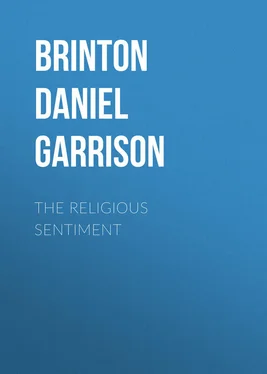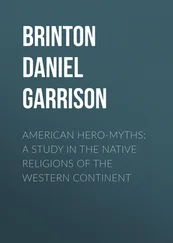Daniel Brinton - The Religious Sentiment
Здесь есть возможность читать онлайн «Daniel Brinton - The Religious Sentiment» — ознакомительный отрывок электронной книги совершенно бесплатно, а после прочтения отрывка купить полную версию. В некоторых случаях можно слушать аудио, скачать через торрент в формате fb2 и присутствует краткое содержание. ISBN: , Жанр: foreign_antique, foreign_prose, на английском языке. Описание произведения, (предисловие) а так же отзывы посетителей доступны на портале библиотеки ЛибКат.
- Название:The Religious Sentiment
- Автор:
- Жанр:
- Год:неизвестен
- ISBN:http://www.gutenberg.org/ebooks/30061
- Рейтинг книги:3 / 5. Голосов: 1
-
Избранное:Добавить в избранное
- Отзывы:
-
Ваша оценка:
- 60
- 1
- 2
- 3
- 4
- 5
The Religious Sentiment: краткое содержание, описание и аннотация
Предлагаем к чтению аннотацию, описание, краткое содержание или предисловие (зависит от того, что написал сам автор книги «The Religious Sentiment»). Если вы не нашли необходимую информацию о книге — напишите в комментариях, мы постараемся отыскать её.
The Religious Sentiment — читать онлайн ознакомительный отрывок
Ниже представлен текст книги, разбитый по страницам. Система сохранения места последней прочитанной страницы, позволяет с удобством читать онлайн бесплатно книгу «The Religious Sentiment», без необходимости каждый раз заново искать на чём Вы остановились. Поставьте закладку, и сможете в любой момент перейти на страницу, на которой закончили чтение.
Интервал:
Закладка:
The consciousness which accompanies volitional action is derived from the common feeling which an organism has, as the result of all its parts deriving their nutrition from the same centre. Rising into the sphere of emotions, this at first muscular sensation becomes “self-feeling.” The Individual is another name for the boundaries of reflex action.
Through memory and consciousness we reach that function of the mind called the intellect or reason, the product of which is thought . Its physical accompaniments are chemical action, and an increase of temperature in the brain. But the sum of the physical forces thus evolved is not the measure of the results of intellectual action. These differ from other forms of force in being incommensurate with extension. They cannot be appraised in units of quantity, but in quality only. The chemico-vital forces by which a thought rises into consciousness bear not the slightest relation to the value of the thought itself. It is here as in those ancient myths where an earthly maiden brings forth a god. The power of the thought is dependent on another test than physical force, to wit, its truth . This is measured by its conformity to the laws of right reasoning, laws clearly ascertained, which are the common basis of all science, and to which it is the special province of the science of logic to give formal expression.
Physical force itself, in whatever form it appears, is only known to us as feeling or as thought; these alone we know to be real; all else is at least less real. 9 9 “Feeling and thought are much more real than anything else; they are the only things which we directly know to be real.” – John Stuart Mill. — Theism , p. 202. How very remote external objects are from what we take them to be, is constantly shown in physiological studies. As Helmholtz remarks: “No kind and no degree of similarity exists between the quality of a sensation, and the quality of the agent inducing it and portrayed by it.” — Lectures on Scientific Subjects , p. 390.
Not only is this true of the external world, but also of that assumed something, the reason, the soul, the ego, or the intellect. For the sake of convenience these words may be used; but it is well to know that this introduction of something that thinks, back of thought itself, is a mere figure of speech. We say, “ I think,” as if the “I” was something else than the thinking. At most, it is but the relation of the thoughts. Pushed further, it becomes the limitation of thought by sensation, the higher by the lower. The Cartesian maxim, cogito ergo sum , has perpetuated this error, and the modern philosophy of the ego and non-ego has prevented its detection. A false reading of self-consciousness led to this assumption of “a thinking mind.” Our personality is but the perception of the solidarity of our thoughts and feelings; it is itself a thought.
These three manifestations of mind – sensations, emotions and thoughts – are mutually exclusive in their tendencies. The patient forgets the fear of the result in the pain of the operation; in intense thought the pulse falls, the senses do not respond, emotions and action are absent. We may say that ideally the unimpeded exercise of the intellect forbids either sensation or emotion.
Contrasting sensation and emotion, on the one side, with intellect on the other, feeling with thought, they are seen to be polar or antithetical manifestations of mind. Each requires the other for its existence, yet in such wise that the one is developed at the expense of the other. The one waxes as the other wanes. This is seen to advantage when their most similar elements are compared. Thus consciousness in sensation is keenest when impressions are strongest; but this consciousness is a bar to intellectual self-consciousness, as was pointed out by Professor Ferrier in his general Law of consciousness. 10 10 The Philosophy of Consciousness , p. 72.
When emotion and sensation are at their minimum, one is most conscious of the solidarity of one’s thoughts; and just in proportion to the vividness of self-consciousness is thought lucid and strong. In an ideal intelligence, self-consciousness would be infinite, sensation infinitesimal.
Yet there is a parallelism between feeling and thought, as well as a contrast. As pain and pleasure indicate opposite tendencies in the forces which guide sensation and emotion, so do the true and the untrue direct thought, and bear the same relation to it. For as pain is the warning of death, so the untrue is the detrimental, the destructive. The man who reasons falsely, will act unwisely and run into danger thereby. To know the truth is to be ready for the worst. Who reasons correctly will live the longest. To love pleasure is not more in the grain of man than to desire truth. “I have known many,” says St. Augustine, “who like to deceive; to be deceived, none.” Pleasure, joy, truth, are the respective measures of life in sensation, emotion, intellect; one or the other of these every organism seeks with all its might, its choice depending on which of these divisions of mind is prominently its own. As the last mentioned is the climax, truth presents itself as in some way the perfect expression of life.
We have seen what pleasure is, but what is truth? The question of Pilate remains, not indeed unanswered, but answered vaguely and discrepantly. 11 11 The Gospel of John (ch. xviii.) leaves the impression that Pilate either did not wait for an answer but asked the question in contempt, as Bacon understood, or else that waiting he received no answer. The Gospel of Nicodemus, however, written according to Tischendorf in the second century, probably from tradition, gives the rest of the conversation as follows: “Pilate says to him: What is truth? Jesus says: Truth is from heaven. Pilate says: Is not there truth upon earth? Jesus says to Pilate: See how one who speaks truth is judged by those who have power upon earth!” [ch. iii.]
We may pass it by as one of speculative interest merely, and turn our attention to its practical paraphrase, what is true?
The rules of evidence as regards events are well known, and also the principles of reaching the laws of phenomena by inductive methods. Many say that the mind can go no further than this, that the truth thus reached, if not the highest, is at least the highest for man. It is at best relative, but it is real. The correctness of this statement may be tested by analyzing the processes by which we acquire knowledge.
Knowledge reaches the mind in two forms, for which there are in most languages, though not in modern English, two distinct expressions, connaitre and savoir , kennen and wissen . The former relates to knowledge through sensation, the latter through intellection; the former cannot be rendered in words, the latter can be; the former is reached through immediate perception, the latter through logical processes. For example: an odor is something we may certainly know and can identify, but we cannot possibly describe it in words; justice on the other hand may be clearly defined to our mind, but it is equally impossible to translate it into sensation. Nevertheless, it is generally agreed that the one of these processes is, so far as it goes, as conclusive as the other, and that they proceed on essentially the same principles. 12 12 The most acute recent discussion of this subject is by Helmholtz, in his essay entitled, “ Recent Progress in the Theory of Vision .”
Religious philosophy has to do only with the second form of knowledge, that reached through notions or thoughts.
The enchainment or sequence of thoughts in the mind is at first an accidental one. They arise through the two general relations of nearness in time or similarity in sensation. Their succession is prescribed by these conditions, and without conscious effort cannot be changed. They are notions about phenomena only, and hence are infinitely more likely to be wrong than right. Of the innumerable associations of thought possible, only one can yield the truth. The beneficial effects of this one were felt, and thus by experience man slowly came to distinguish the true as what is good for him, the untrue as what is injurious.
Читать дальшеИнтервал:
Закладка:
Похожие книги на «The Religious Sentiment»
Представляем Вашему вниманию похожие книги на «The Religious Sentiment» списком для выбора. Мы отобрали схожую по названию и смыслу литературу в надежде предоставить читателям больше вариантов отыскать новые, интересные, ещё непрочитанные произведения.
Обсуждение, отзывы о книге «The Religious Sentiment» и просто собственные мнения читателей. Оставьте ваши комментарии, напишите, что Вы думаете о произведении, его смысле или главных героях. Укажите что конкретно понравилось, а что нет, и почему Вы так считаете.












